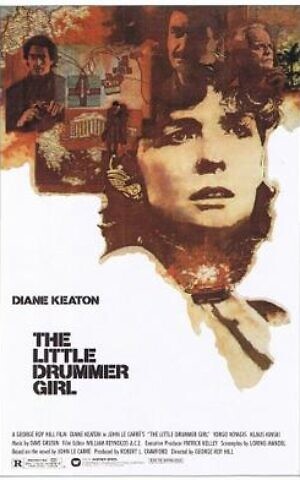John le Carre, the master spy novelist, who died Sunday aged 89, had a long fascination and sympathy for the Jewish people and a deep admiration for Israel.
Jewish characters were interwoven in his many novels and his research into the 1983 novel “The Little Drummer Girl,” gave him his first real exposure to Israel, an experience that “rocked” him to his boots, he said in a rare 1998 interview with Douglas Davis of the Jewish World Review.
“Israel,” he told Davis, “rocked me to my boots. I had arrived expecting whatever European sentimentalists expect — a re-creation of the better quarters of Hampstead [in London]. Or old Danzig, or Vienna or Berlin. The strains of Mendelssohn issuing from open windows of a summer’s evening. Happy kids in seamen’s hats clattering to school with violin cases in their hands…”
Instead, what he recalled finding was “the most extraordinary carnival of human variety that I have ever set eyes on, a nation in the process of re-assembling itself from the shards of its past, now Oriental, now Western, now secular, now religious, but always anxiously moralizing about itself, criticizing itself with Maoist ferocity, a nation crackling with debate, rediscovering its past while it fought for its future.”
“No nation on earth,” he said, ” was more deserving of peace — or more condemned to fight for it.”

Poster of the 1984 film adaptation of “The Little Drummer Girl” (Wikimedia commons)
The author, whose real name was David Cornwell, wrote 25 novels and one memoir in a career spanning six decades, selling some 60 million books worldwide and defining the Cold War spy thriller.
But it was only in the 1980’s that Le Carre decided to tackle the subject that “had long been in my sights, even if it had always scared the wits out of me: the Arab-Israeli conflict.”
Le Carre made a series of visits across the region to Amman, Damascus, Beirut, South Lebanon, Tunis and repeated visits to Israel. His meetings included one with Palestinian leader Yasser Arafat, who held his hand to his chest to feel “the Palestinian heart.”
“I knew nothing of the Middle East, but then I have always seen my novels as opportunities for self-education,” he said.
Writing the novel, left him a staunch supporter of the Jewish state.
Asked where he stood after his journey, le Carre replied: “Where I began — only more so. I mean, I stood — and stand — wholeheartedly behind the nation-state of Israel as the homeland and guardian of Jews everywhere. And wholeheartedly behind the peace process as the guarantor not only of Israel’s survival, but of the Palestinian survival also.”
Beyond Israel, le Carre also described his affinity for the Jewish people and for creating Jewish characters in his works.
Even his most famous character, the ambiguous spymaster George Smiley, is almost Jewish, he said. “It is a sheer fluke,” said le Carre, “that Smiley himself is not a Jew.” And then: “Perhaps he is.”
Le Carre described the impact of a visit to the “unbeautified camps” of Belsen and Dachau soon after the Second World War, which left a deep impact on him. As did his encounters with post-war Jewish refugees.
“To this day,” he said, “there is no museum and no film, however fine, not even a book, that can compare with the living impact of those places on me.”
However, le Carre’s writings also drew accusations of anti-Semitism, particularly from within the US.
This was a result, he said, of trying to channel “the careless chamber music of English prejudice,” in his writing.
“I have been so keen to reproduce it in my books that sometimes the undiscerning have mistaken the singer for the song,” he said.

British author John le Carre holds a copy of his new book entitled ‘Our Kind of Traitor’ at a central London bookstore during a book signing event to mark the launch of the novel in London Thursday, Sept. 16, 2010. Le Carre’s real name David Cornwall who worked in the 1950’s and 60’s for British intelligence agencies most famous books centre on his spy master George Smiley character in the Smiley Trilogy. (AP Photo/Alastair Grant)
In 2019 he joined with several prominent British public figures, including authors, historians and actors, to issued an open letter, saying they could not vote for the Labour Party in upcoming elections due to the UK opposition party’s anti-Semitism scandals.
“We listen to our Jewish friends and see how their pain has been relegated as an issue, pushed aside by arguments about Britain’s European future. For those who insist that Labour is the only alternative to Boris Johnson’s hard Brexit, now, it seems, is not the time for Jewish anxiety,” the signatories wrote.
The letter said the issue of anti-Semitism was “central to a wider debate about the kind of country we want to be” and that to ignore it because of Brexit would signal that tolerating “anti-Jewish prejudice is a price worth paying for a Labour government.”
“Which other community’s concerns are disposable in this way? Who would be next?” it said.
Related posts:
Views: 1
 RSS Feed
RSS Feed

















 December 14th, 2020
December 14th, 2020  Awake Goy
Awake Goy  Posted in
Posted in  Tags:
Tags: 
















